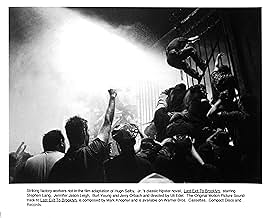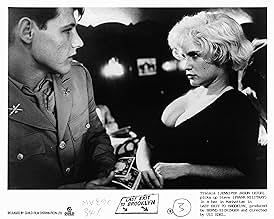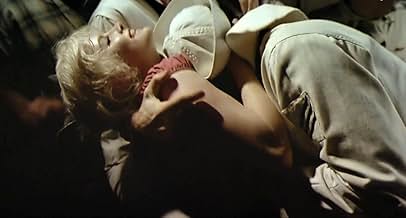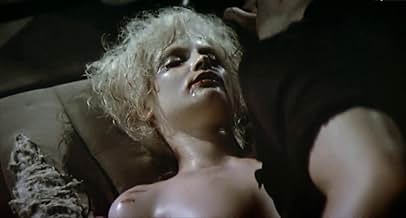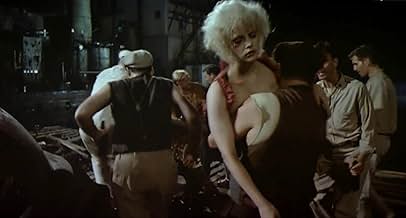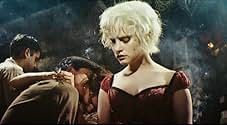IMDb RATING
6.8/10
7.4K
YOUR RATING
Set in Brooklyn during the 1950s against a backdrop of union corruption and violence. A prostitute falls in love with one of her customers. Also a disturbed man discovers that he is homosexu... Read allSet in Brooklyn during the 1950s against a backdrop of union corruption and violence. A prostitute falls in love with one of her customers. Also a disturbed man discovers that he is homosexual.Set in Brooklyn during the 1950s against a backdrop of union corruption and violence. A prostitute falls in love with one of her customers. Also a disturbed man discovers that he is homosexual.
- Director
- Writers
- Stars
- Awards
- 6 wins & 1 nomination total
Frank Acciarito
- Eddie
- (as Frank Acciarto)
- Director
- Writers
- All cast & crew
- Production, box office & more at IMDbPro
Featured reviews
After being blown away by the film version of Requiem for a Dream, I recently began reading some of Selby's books. I started with The Room and moved on to Last Exit to Brooklyn. Tonight I watched the film.
I think it's very unfortunate that people have criticized it here for exactly the qualities that make it unique compared to most American films. Yes, it's dark, and yes, there are not always clear resolutions to every character's part of the story. Those are qualities present in Selby's book and it would have been a shame for the filmmakers to abandon them, just as it would have been a shame for Aronofsky to cave to the pressures to find a happier ending for his film of Requiem...
As a reader of the book I think those negative comments are even more misguided, because the screenwriter did quite a bit to try to make the material more accessible for the viewing audience. He intertwined what are essentially separate stories (the book is more like a collection of short stories around related themes than a traditional novel), and found what was probably the happiest ending possible given the material. The book doesn't end on the relief of the end of the strike, but finishes with an amazing coda that contains characters like Abraham, a man who spends money on clothes and his car but won't cough up to buy vitamins for his malnourished children.
My one big complaint about the screenplay was the treatment of Harry Black's character. In the book he is a largely ineffectual blowhard who is laughed at by almost everyone around him, but in the film he is almost heroic at times, leaping into the middle of the confrontation at the picket line. I think his descent is more credible in the book, but Selby was also able to get inside Harry's head on paper in a way that's difficult to translate into film.
Overall I think this film is a very excellent adaptation of extremely difficult material, and I recommend it to anyone who is willing to watch a story about the pain and suffering that happens in everyday life without the Hollywood gloss.
I think it's very unfortunate that people have criticized it here for exactly the qualities that make it unique compared to most American films. Yes, it's dark, and yes, there are not always clear resolutions to every character's part of the story. Those are qualities present in Selby's book and it would have been a shame for the filmmakers to abandon them, just as it would have been a shame for Aronofsky to cave to the pressures to find a happier ending for his film of Requiem...
As a reader of the book I think those negative comments are even more misguided, because the screenwriter did quite a bit to try to make the material more accessible for the viewing audience. He intertwined what are essentially separate stories (the book is more like a collection of short stories around related themes than a traditional novel), and found what was probably the happiest ending possible given the material. The book doesn't end on the relief of the end of the strike, but finishes with an amazing coda that contains characters like Abraham, a man who spends money on clothes and his car but won't cough up to buy vitamins for his malnourished children.
My one big complaint about the screenplay was the treatment of Harry Black's character. In the book he is a largely ineffectual blowhard who is laughed at by almost everyone around him, but in the film he is almost heroic at times, leaping into the middle of the confrontation at the picket line. I think his descent is more credible in the book, but Selby was also able to get inside Harry's head on paper in a way that's difficult to translate into film.
Overall I think this film is a very excellent adaptation of extremely difficult material, and I recommend it to anyone who is willing to watch a story about the pain and suffering that happens in everyday life without the Hollywood gloss.
In 1952, a panoramic view of the other side of North America is presented through the life of different characters and their dramatic stories, having Brooklyn in common. Tralala (Jennifer Jason Leigh) is a prostitute, connected with a violent street gang composed of small time crooks. They swindle most of Tralala clients, stealing their money. She meets a young lieutenant from Idaho, who falls in love with her. The labor union is on strike against the employers, placing picket against the trucks and protesting in front of the factory. American soldiers are again fighting in another war, this time against Korea. Maybe the only missing point in this film is the declared racism of those times. This sad, depressive and violent movie is another great work of Uli Edel, mainly known by `Christiane F'. The cast has amazingly performances, and the scene when Tralala is raped by dozens of men in an abandoned car is one of the most strong I have ever seen in a movie. I agree with the words of IMDB User Comments: `Great film, but not a piece of entertainment'. My vote is eight.
Title (Brazil): `Noites Violentas no Brooklin' (`Violent Nights in the Brooklyn')
Title (Brazil): `Noites Violentas no Brooklin' (`Violent Nights in the Brooklyn')
Last Exit to Brooklyn is a great flick. It's brutal, dark, funny as heck at times, and in the end uplifting. Watching this movie it was hard to imagine this was based on a book from the 50's. A book which explores homosexuality, prostitution, sexual confusion would seem to be almost unheard of subjects in the uptight, Leave It To Beaver 1950's. People who put down this film don't know what they're talking about. The author of the book this movie was based on said himself he thought this was one great adaptation of his novel. And he was sure right. Folks who can handle the dark, brutal films of David Lynch, the Coen Brothers and Tarantino, Scorsese, Kubrick, Hartley and Fosse will dig this movie. But if "You've Got Mail" is your idea fo a great rental, you won't like it a bit. It's just as well, a lot of great, cool films aren't for everyone.
Mark Knopfler's beautiful and melancholy score paints a haunting and pained picture, over this, an extremely hard-hitting drama, superbly directed by Uli Edel.
For 1989, its release date and set around Brooklyn in the 1952, this is as strong as films got. The "C" word, rape scenes, florid homosexuality and sexual violence - from a novel (by Hubert Selby jnr) that was initially banned under the Obscene Publications Act.
So, why watch it? There's a sense of brooding beauty about it, in the same way that West Side Story had flawed characters, in so many conflicts, within their own community and incomers, such as military servicemen, at night, looking for a great time. Enter busty, platinum blonde and cocky Jennifer Jason Leigh, who gets men in bars buying her drinks, leads them out for some 'fun' and then her mates bash him round the head with a bottle. Grabbing the money, they're just those hoodlums from west Side...just older, doing worse things.
Stephen Lang, meanwhile, is the shop steward for a union, that's called its dockside workers out. He's raking in on expenses, for things he doesn't even need. He's got a wife and baby, but leaves them at night to go out with Regina (actually, Reginald) a camp gay and his bitching transvestite buddies.
As you can see, this is strictly for adults and no, I haven't read the book. A friend I lent the DVD to, who's read all manner of literature, from the classics to strong stuff like this, just said "Wow".
It's a memorable and distinctive film. Not one that's known, either commercially, or infamously. It doesn't seem to get bundled up with the likes of Natural Born Killers or A Clockwork Orange. Maybe cos it has a heart; a survivoral instinct that's most apparent in the Italian families in the film, headed by Burt Young, who of course played Paulie, Rocky Balboa's wheezing training aide, in the Rocky movies.
My Universal release has a fine transfer and is quite cheap, especially secondhand. So, if you want something pretty edgy, but with a heart and a pulse, this could end up in your player.
For 1989, its release date and set around Brooklyn in the 1952, this is as strong as films got. The "C" word, rape scenes, florid homosexuality and sexual violence - from a novel (by Hubert Selby jnr) that was initially banned under the Obscene Publications Act.
So, why watch it? There's a sense of brooding beauty about it, in the same way that West Side Story had flawed characters, in so many conflicts, within their own community and incomers, such as military servicemen, at night, looking for a great time. Enter busty, platinum blonde and cocky Jennifer Jason Leigh, who gets men in bars buying her drinks, leads them out for some 'fun' and then her mates bash him round the head with a bottle. Grabbing the money, they're just those hoodlums from west Side...just older, doing worse things.
Stephen Lang, meanwhile, is the shop steward for a union, that's called its dockside workers out. He's raking in on expenses, for things he doesn't even need. He's got a wife and baby, but leaves them at night to go out with Regina (actually, Reginald) a camp gay and his bitching transvestite buddies.
As you can see, this is strictly for adults and no, I haven't read the book. A friend I lent the DVD to, who's read all manner of literature, from the classics to strong stuff like this, just said "Wow".
It's a memorable and distinctive film. Not one that's known, either commercially, or infamously. It doesn't seem to get bundled up with the likes of Natural Born Killers or A Clockwork Orange. Maybe cos it has a heart; a survivoral instinct that's most apparent in the Italian families in the film, headed by Burt Young, who of course played Paulie, Rocky Balboa's wheezing training aide, in the Rocky movies.
My Universal release has a fine transfer and is quite cheap, especially secondhand. So, if you want something pretty edgy, but with a heart and a pulse, this could end up in your player.
Did you ever notice that if you were to show a film to after dinner friends, all too often what you bring out is a work that might not make a list of your personal top ten favorite movies? This is one of those films. Very postwar early 50's, but a 1950's Donna Reed would have been lost in. It truly is the opposite of Pleasantville.
Hubert Selby's dark vision of the common man is woven around several characters in a Brooklyn neighborhood. A factory worker called Big Joe is played by Burt Young. Instinctively brutal yet pathetically naive, he wanders through his Brooklyn neighborhood functioning at the most elemental level reinforced only by an inherited value system to which he is single-mindedly loyal. Jennifer Jason Leigh plays a whore whose timeline for thoughts of her future stretches out only several hours. She gets by in life rolling drunks whose tolerance for liquor is less than hers, or giving sex to those who outlast her. A soldier soon to be shipped out takes her to Manhattan for his last few stateside days and falls in love with her. Tralala (Leigh's character) recognizes the attendant lust but has no clue about the implications of his love. As she sees him off, the Lieutenant hands her an envelope. Tra's face lights up as her vision of the order in life (she gives him sex, he has a good time, he gives her money) seems to have been reaffirmed. When the envelope turns out to contain a lengthy love letter she doesn't become angry or disappointed, just confused.
In addition to Leigh and Young, powerful performances are turned in by Jerry Orbach (the corrupt union boss), Stephen Lang (the closet homosexual strike-line foreman), Stephen Baldwin (a street punk), Ricki Lake (Big Joe's very pregnant daughter), and Alexis Arquette (the teen-age transvestite).
The soundtrack is excellent and unobtrusive and Uli Edel's direction insightful. You need a strong stomach to watch it and quite a bit of dedication to find it, but it's well worth the effort.
Hubert Selby's dark vision of the common man is woven around several characters in a Brooklyn neighborhood. A factory worker called Big Joe is played by Burt Young. Instinctively brutal yet pathetically naive, he wanders through his Brooklyn neighborhood functioning at the most elemental level reinforced only by an inherited value system to which he is single-mindedly loyal. Jennifer Jason Leigh plays a whore whose timeline for thoughts of her future stretches out only several hours. She gets by in life rolling drunks whose tolerance for liquor is less than hers, or giving sex to those who outlast her. A soldier soon to be shipped out takes her to Manhattan for his last few stateside days and falls in love with her. Tralala (Leigh's character) recognizes the attendant lust but has no clue about the implications of his love. As she sees him off, the Lieutenant hands her an envelope. Tra's face lights up as her vision of the order in life (she gives him sex, he has a good time, he gives her money) seems to have been reaffirmed. When the envelope turns out to contain a lengthy love letter she doesn't become angry or disappointed, just confused.
In addition to Leigh and Young, powerful performances are turned in by Jerry Orbach (the corrupt union boss), Stephen Lang (the closet homosexual strike-line foreman), Stephen Baldwin (a street punk), Ricki Lake (Big Joe's very pregnant daughter), and Alexis Arquette (the teen-age transvestite).
The soundtrack is excellent and unobtrusive and Uli Edel's direction insightful. You need a strong stomach to watch it and quite a bit of dedication to find it, but it's well worth the effort.
Did you know
- TriviaRalph Bakshi had made a previous attempt to direct the film, a production he was to co-produce with Steve Krantz and author Hubert Selby Jr. Actor Robert De Niro accepted a major role in the film. However, the project fell apart when Bakshi and Krantz had a falling out. Bakshi and Selby became friends, and, according to Bakshi, they "tried a few other screenplays after that on other subjects, but I could not shake Last Exit from my mind."
- SoundtracksBe Ba-ba Le-ba
Written and Performed by Helen Humes
Courtesy of CEMA Special Markets/EMI Records, Inc.
- How long is Last Exit to Brooklyn?Powered by Alexa
Details
- Release date
- Countries of origin
- Language
- Also known as
- Letzte Ausfahrt Brooklyn
- Filming locations
- Production companies
- See more company credits at IMDbPro
Box office
- Gross US & Canada
- $1,730,005
- Opening weekend US & Canada
- $186,489
- May 6, 1990
- Gross worldwide
- $1,730,005
- Runtime1 hour 42 minutes
- Color
- Aspect ratio
- 1.85 : 1
Contribute to this page
Suggest an edit or add missing content



